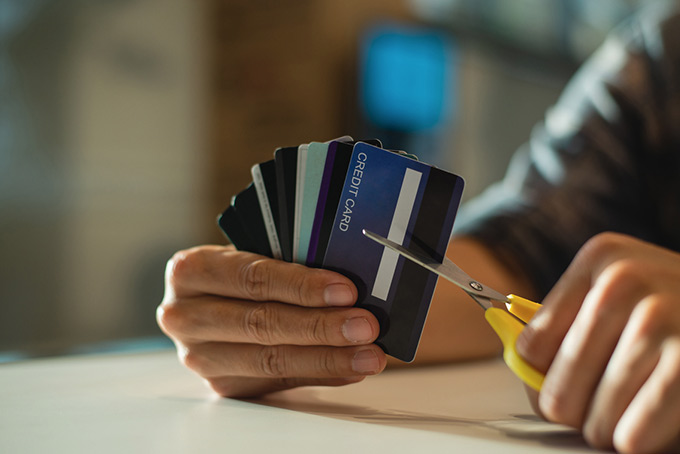Are you considering closing a credit card? Whether you’re trying to curb your credit card spending, feel you have too many credit cards that you never use, keep an account open even though it doesn’t fit your lifestyle anymore, or another valid reason, there are some important things to consider before you make the move to close a credit card account for good.
How Can Closing a Credit Card Hurt My Credit?
First, you need to recognize that closing a credit card account can damage your credit score. You hear so much about the dangers of credit card use that it might sound counterintuitive, but it’s often a smart move to keep unused credit cards open. Your credit score actually benefits from a longer average credit history and a larger amount of available credit.
- Credit longevity. It’s particularly important to hang onto the oldest account on your credit report – that shows creditors how long you’ve been “in the game,” which factors into your overall credit score.
- Credit utilization. Closing an account also lowers your credit utilization ratio, the percent of available credit you’re currently using.
- Thin credit. If you have few open credit accounts, closing a credit card can make it harder to qualify for other loans in the future.
- Qualifying for credit. If you intend to apply for credit in the near future – say, for a new car loan or a mortgage – it’s best not to cancel any credit card accounts until the new loan has been approved.

(Keep in mind, though, a closed account in good standing stays in your credit history for 10 years and gets factored into your score. So while your score will take a hit initially after closing a credit card, the dip should only stick around for a few months.)
How Can I Safely Close a Credit Card?
You might have a justifiable reason for wanting to close your account. If you’ve factored in the above points and it still makes sense for your situation, keep the following in mind:
- Pay off the card. Be sure to pay off the entire balance before initiating the process to close the account.
- Redeem your points. If it’s a rewards card, don’t forget to cash in any remaining rewards before canceling the card – otherwise, you’ll lose them.
- Switch automatic payments. If the card is attached to any recurring payments, be sure to switch to another form of payment before closing the account.
- Notify other authorized users. When you close your account, all affiliated credit cards will be deactivated. Make sure all authorized users know to stop using (and destroy!) their cards.
- Contact customer service. You’ll need to call your lender to tell them that you want to close the account. Be sure to request confirmation of your request in writing, and ask them to note that the account was closed at your request.
- Be patient – but persistent. It sometimes takes a few weeks to process your closure request. But if you’ve been waiting a month or longer without receiving a confirmation letter, follow up with another call to your credit card issuer to learn the status of your account.
- Destroy the card. Once you’ve gotten confirmation that the account has been successfully closed, cut up the card into tiny pieces. If you have a heavy-duty shredder that’s built to handle plastic, use that. If not, use sharp scissors or shears. To further protect yourself from identity theft, consider throwing away the pieces in different trash bags around your home.
If you’re still confused or uneasy about canceling a credit card, or are just looking for more advice on savvy credit card practices, don’t hesitate to reach out to DebtGuru.com. One of our friendly advisors will be more than happy to speak with you about your credit card questions or concerns.
